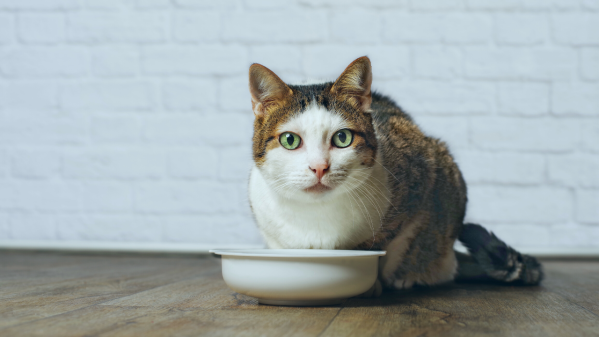We love our kitties and want them to be happy and well fed, but how do we even start to know what food is the best for them? Is it simply the food they most enjoy? Or the foods that will help them be healthy and well-nourished. Our cats may have one answer to that question but we know the right answer is what is best for their long-term health, and that starts with understanding what it is they actually do need, nutrition-wise.
Cats are known to be obligate carnivores. That means that it is an absolute must for them to have meat in their diet, this is because they require certain nutrients that can only be found in animal meat. “Without nutrients such as taurine and arginine (found in meat and fish) in their diets, your kitty could become extremely ill,” says Lucie Wilkins, a registered vet nurse and a cat blogger at Kitty Cat Tree.
What's the best food for your cat?
What a cat needs nutrition wise will, much like with humans, change with their age and life situation. “As an experienced vet nurse, I would always recommend life stage feeding for your cat,” says Wilkins. This means that the food they are eating should contain the different levels of protein, amino acids, vitamins, minerals and fat (the animal fat will ensure your cat has enough vitamin A) that they need for their development..
For life stage feeding, says Wilkins, most cat foods are usually categorized into the following age groups:
Kitten - up to 12 months
Adult - 1 to 7 years
Senior - 7 to 11 years
Geriatric - 11+ years
When choosing cat food for your beloved feline (unless they have specific dietary needs) it is important to choose a food that is listed as complete rather than complementary. “Complete food will include all that is required to keep your cat happy and healthy,” says Wilkins.
The ingredients that should be in your cat's food
So what ingredients should you be looking out for when searching for a quality balanced food for your cat?
Protein
First off, a named protein source. “A high quality cat food should be specific about which meat or fish the protein has come from rather than listed as ‘meat,” says Wilkins. You will want to be looking for listed ingredients such as ‘chicken heart’ for example.
Carbohydrates
Cats do not need carbohydrates to thrive, however these are added to cat foods as “fillers”. “They are needed in dry food to help combine and stick all the ingredients together,” says Wilkins, who advises that foods which include fillers in wheat or grain form to be avoided (cats are often allergic to these ingredients). It is best to find foods with listed ingredients such as potato starch, sweet potatoes or peas.
A specific listed source of fat
Wilkins says an example of this would be something like chicken fat, turkey fat etc and in some premium foods you may also find oils as a listed ingredient.
Added vitamins
Many better quality cat food will have added vitamins and minerals, such as vitamin C and Vitamin E, according to Wilkins.
Taurine
A deficiency in taurine will have detrimental health effects to your cat, says Wilkins.
Important cat nutrition tips
Make sure your cat has access to clean water
As well as finding food with the ingredients listed above, it is important that your cat always has access to a clean source of water. "A question I often hear asked is if a cat should be given milk to drink,” says Wilkins. “Cats should never be given milk, most cats are lactose intolerant and milk can cause them severe tummy upset,” says Wilkins. As well as not agreeing with them, milk also contains sugar, which is unnecessary for your cat's diet and can result in your kitty becoming unhealthily overweight.
Do not share human food with your cat
Wilkins also advises that as cat parents, do not share your human food with your cat, there are a few reasons this is advised against: “Some cats who are used to receiving alternative foods will then refuse their own, it unbalances the cats diet and will often cause them to gain weight,” says Wilkins. Lastly, your cat may misbehave during your meal times, so that they are given food.
Do not put your cat on a vegetarian/vegan diet
Do not attempt to feed your cat a vegetarian or vegan diet, warned Wilkins, your cat will become malnourished and unhealthy. It is important to always put your cat's health first.
So what should cats be eating? These options are a strong start.
The best cat foods, recommended by vets
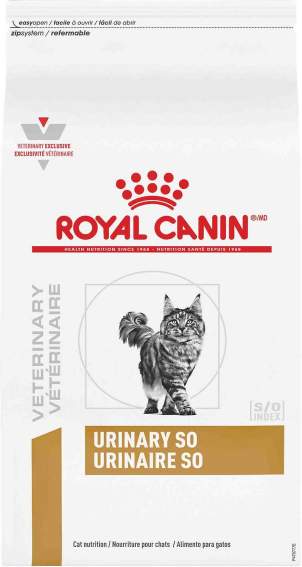
Royal Canin$85
This is the “only company that offers "breed-specific diets" for example they have a Maine Coon and Siamese diet made with ingredients specifically formulated for what that breed needs,” says Dr. Laura Robinson, Pawp’s lead vet. This line does this by employing veterinary nutritionists to “oversee all their recipes and production,” said Dr. Robinson and have “many different options for what may be best for your cat — for example appetite control and indoor cat.”
17.6 lb. bag

Science Diet$48
Dr. Robinson is a fan of this brand of cat food because they also employ veterinary nutritionists and have many different options as well for different life stage options — kitten, adult, senior etc. “They’ve been around a long time and have conducted a lot of research behind their food,” says Dr. Robinson.
15.5 lb. bag
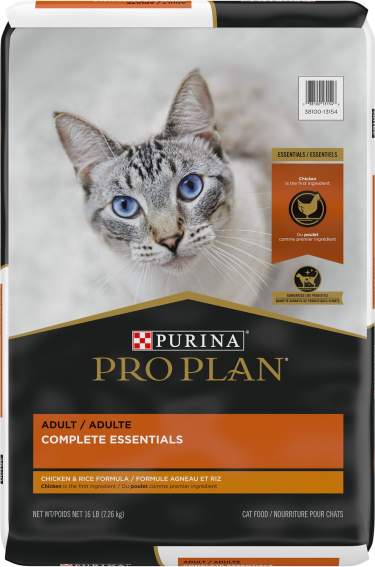
Purina Pro Plan$39
This is another line that employs veterinary nutritionists and offers many different options. “Purina has many different options but their pro plan line is the best and highest quality,” says Dr. Robinson, who continued that they “even have a diet that helps reduce cat allergies in people who may be allergic.” This is a brand that also has been around a long time and is research backed.
16 lb. bag
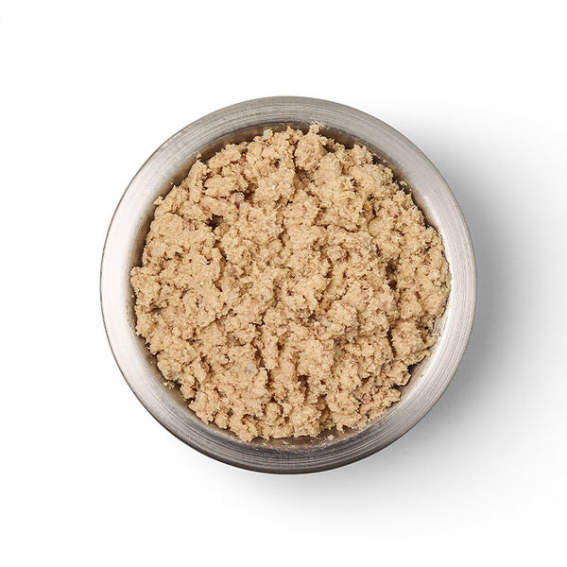
Just Food for Dogs Just Cats Fish & Chicken$12
Made with no preservatives, Dr. Robinson says this is a choice that is great for cats with sensitive stomachs. “It increases hydration status” and is the best fresh food option, and this line also has veterinary nutritionists.
18 oz. can
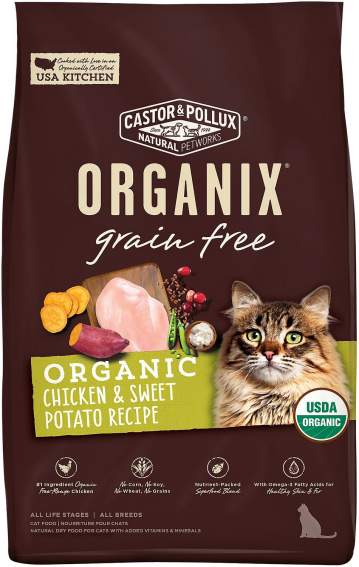
Castor & Pollux Organix Grain-Free Organic Dry Cat Food$48
“Perfect organic choice for cats, its ingredients are free from chemical pesticides, synthetic fertilizers, no artificial preservatives, and no added antibiotics or growth hormones,” says Wilkins. It also includes omega 3 fatty acids to help promote healthy skin and fur.
10 lb. bag
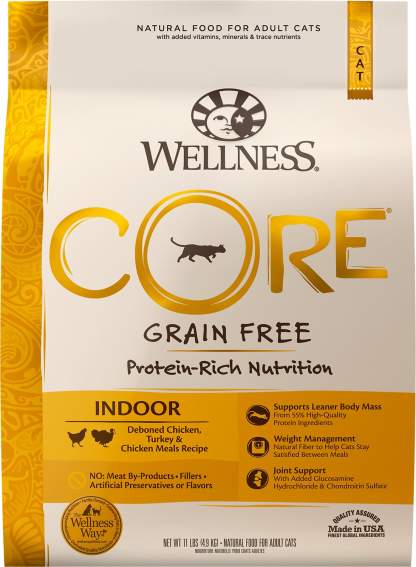
Wellness CORE Dry Cat Food Grain-Free$41
No artificial ingredients, flavors, or preservatives. It has a high quality natural protein content and is well-balanced, making it a suitable candidate for most cats. “From my experience cats seem to love the flavor and haven’t had one turn it down yet!” says Wilkins.
11 lb. bag
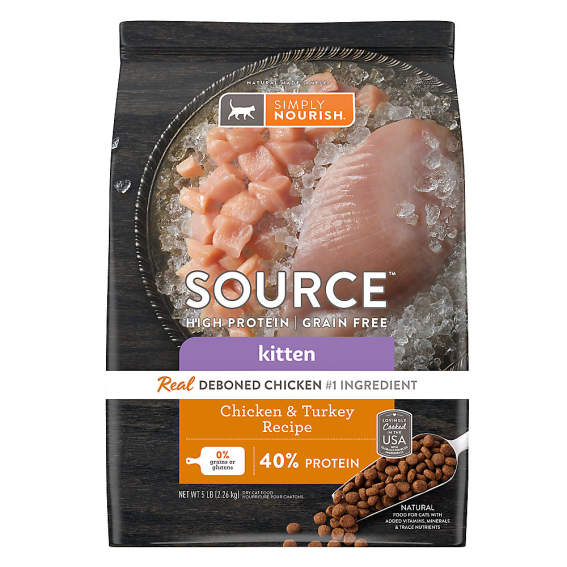
Simply Nourish SOURCE Kitten Dry Food$19
“A complete meal within 70% chicken and turkey, it’s rich in amino acids promoting strong muscle growth for kittens,” says Wilkins. It has added vitamin E and taurine to support a developing immune system and healthy heart development.
5 lb. bag
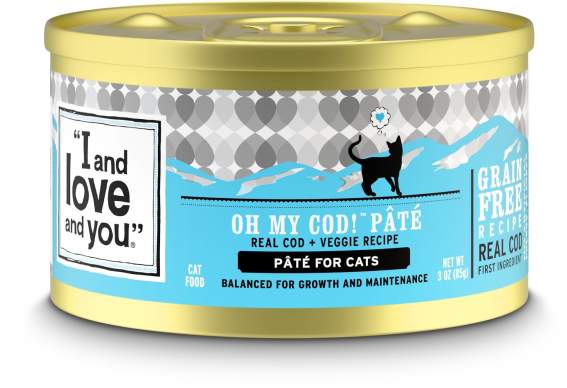
“I and love and you” Oh My Cod! Pate $20
This hearty meal is made with real cod and veggies! “This delicious canned cat food is carrageenan free, has omegas 3 and 6 for a healthy and shiny coat, and made with only real ingredients,” says Dr. Angie Krause, DVM, CVA, CCRT. No corn, wheat, rice, or white potatoes! This formula should be fed at room temperature, but must be refrigerated if opened.
5 oz. can, pack of 12
